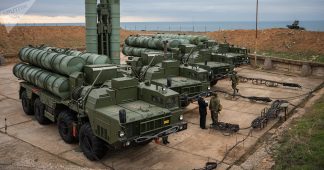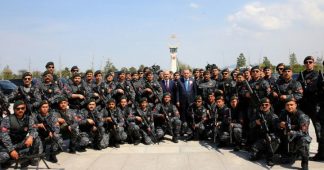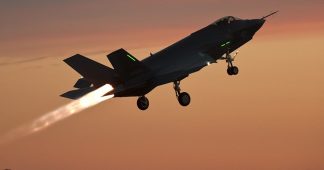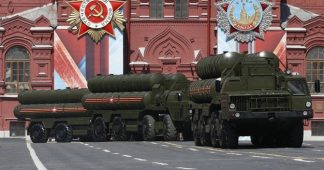The War Between America’s Military-Industrial Complex And Turkophobic Lobbies Pushes Ankara Into Russia’s Arms
A war between the military-industrial complex and increasingly radical ethno-confessional lobbies
Both the Pentagon and the equally powerful corporate wing of military-industrial complex remain insistent that the delivery of the F-35 fighter jets ordered by Turkey must commence as originally scheduled. While Turkey remains adamant that it will soon also take delivery of Russia’s S-400 missile defence systems, US Defence Secretary James “Mad Dog” Mattis has warned of the dangers of applying CAATSA sanctions to US partners who also purchase Russian hardware and hardware upgrades. Meanwhile representatives of the American firm Lockheed Martin, the markers of the F-35, have vowed to attend a ceremony on the 21st of June celebrating the delivery of Turkey’s new American made fifth generation fighter jets.
However, these plans might be thrown into disarray by US Senators who just passed The National Defense Authorization Act (NDAA) which contains clauses blocking the delivery of F-35s to Turkey based on American opposition to Ankara’s S-400 purchase from Russia. However, while Russia is the perennially convenient bogeyman regarding a willingness among multiple actors within the US to delay or stop Turkey from receiving the American jets – the reality is that a wave of Turkophobia spread by powerful ethno-religious lobby groups in the US is behind these anti-Ankara measures, while Russia is merely the geopolitical fall-guy in the equation.
The perfect storm of Turkophobia
In the US, a new alliance between the powerful Jewish lobby and the less powerful but still influential Armenian and Hellenic lobbies is working together to muster Congressional support for Turkophobic measures which includes the blocking of the F-35 deal that the military-industrial complex is eager to deliver.
For much of the 20th and 21st centuries, the large American based Hellenic and Armenian lobbies have agitated for a less friendly US approach to Turkey. For the Armenian lobby, the main goal is to convince the US Federal government to recognise the tragic events of 1915 as “The Armenian Genocide” while the Hellenic lobby has sought to persuade Washington to pressure Ankara into acknowledging the early 20th century conflict in western Anatolia as the “Pontic Genocide”. Additionally, the US Hellenic lobby has for years attempted to persuade NATO to take a tougher line on the status of Northern Cyprus. Thus far, none of these lobbying attempts have met with the desired success of the respective lobbies at a Federal level.
While the US based Jewish lobby is traditionally more powerful than either the Hellenic or Armenian lobbies, the US Jewish lobby has generally had little negative to say about Turkey in-line with the fact that of all of the Muslim majority governments in the region Tel Aviv had its best relations with Ankara, as well as the overriding reality that Turkey never passed any antisemitic legislation as most of the powers of Europe did prior to the mid-20th century.
But with Turkish President Erdogan openly calling for a wider pan-Islamic movement for Palestine, all the while calling “Israel” a terrorist state, the US Jewish lobby like “Israeli” politicians, have joined traditional foes of Turkey in openly agitating for a more anti-Turkish position from the US government.
This has expressed itself both domestically in the US and geopolitically in terms of “Israel’s” new regional partnerships. Against this background, it is perhaps not surprising that Gilad Erdan, a member of Benjamin Netanyahu’s Likud faction has called for Tel Aviv to recognise the events of 1915 as an “Armenian Genocide”. If “Israel” were to officially to do this, it would represent a clear break between Tel Aviv and Ankara and quite possibly a point of no return. The more Turkey stands up for Palestine, the more voices like those of Erdan will become amplified in arguing for a move that is less about Armenia (a traditionally anti-Zionist nation) than about sending a clear message to Turkey that the partnership has run its course.
Turkey is neither frightened nor amused
The recent deal struck between Washington and Ankara to jointly disarm or otherwise neutralise YPG/PKK terrorists (who are still technically allied with the US in much of northern Syria) in the northern Syrian city of Manbij has already gone into effect. Yesterday, Turkey’s President Erdogan confirmed that Turkish troops are now massing on the outskirts of Manbij in line with the agreement reached with the United States. This has helped to east some of the many tensions that Ankara still has with Washington, but if the US Congress spoils the F-35 deal, the minor upturn in US-Turkey relations could sharply decline once again.
Turkey has been adamant that no amount of US bullying up to and including the threat or reality of sanctions will be able to coax Ankara into nixing its S-400 deal with Russia. In fact, Turkish officials have repeatedly stated that if the F-35 deal is quashed by actors in Washington, Turkey will look to purchase F-35 rivals from other producers, with Russia’s Su-57 being the clear choice as a more moderately priced alternative to America’s problem prone F-35s.
The geopolitical and energy ramifications of America’s lobby bullies
“Israeli” officials recently boasted that their F-35’s were the only ones being flown by any Middle Eastern power. These remarks were clearly designed to both taunt rival Turkey and to send a message to the pro-“Israel” agitators in the US that their lobbying of Congress to try and stop the delivery of jets to Turkey has been at least partly successful.
At the same time, “Israel” has been pivoting its strategic regional alliances ever more towards Ankara’s hated Hellenic adversaries. “Israel” continues to work with Greece and Cyprus on joint military exercises while Tel Aviv further seeks to explore the possibility of working with both Nicosia and Turkey’s rival Egypt on a gas pipeline specifically designed to both circumvent and provoke Turkey.
According to the pro-Brussels New Europe,
“The EastMed gas pipeline would circumvent Turkey, which has increased tensions with Cyprus, Greece and Israel recently, providing a way to transport newly discovered gas supplies from the East Mediterranean to Europe. The talks in Nicosia in May follow a memorandum of understanding regarding the EastMed pipeline, which was signed in December.
According to the Public Gas Corporation of Greece (DEPA), the EastMed will connect the recently discovered gas fields in the Levantine Basin, in the southeast Mediterranean, with mainland Greece and is projected to carry 8-14 billion cubic meters per year of natural gas to Greece and Europe.
According to DEPA, the approximately 1900 kilometer long pipeline (700 kilometers on-shore, 1200 off-shore) consists of the three following main sections, as well as compressor stations located in Cyprus and Crete: a pipeline from the fields to Cyprus, a pipeline connecting Cyprus to Crete, and a pipeline from Crete crossing mainland Greece up to the Ionian coast.
From there the EastMed can link up with the offshore Poseidon pipeline enabling the delivery of additional diversified sources from the Levantine to Italy and beyond. The EastMed pipeline is preliminarily designed to have exit points in Cyprus, Crete, and mainland Greece as well as the connection point with the Poseidon pipeline”.
The deal to create such a pipeline was sealed in December of 2017 while glowing reports from pro-EU media touted the deal as a means of allowing Europe to decrease its dependence on Russian gas while also offering “Israel” a chance to swap Turkey for EU partners. As Turkey’s long paralytic bid to join the EU is now de-facto over, both Europe and “Israel’s” cooperation over a new East Mediterranean gas pipeline has the effect of drawing Russia and Turkey into an even closer partnership than the one they are currently in.
At the moment the Turkstream pipeline designed to bring Russian gas into Europe via Turkey is a major joint project between Moscow and Ankara. Now, both the EU and “Israel” are looking to challenge this route with a pipeline of their own in a similar region. In reality, there is enough demand for gas in Europe and “Israel” to mean that both pipelines can coexist, but the geopolitical optics are clear enough. Tel Aviv has joined forces with the most anti-Ankara states in the EU in order to cut Turkey out of “Israel’s” future.
Conclusion
“Israel’s” energy alliance with Egypt and Cyprus and its burgeoning military alliance with Greece and Cyprus is designed to cut Turkey out of important economic inroads to the Levant. When combined with the simultaneous lobbying efforts of pro-“Israel”, pro-Hellenic and pro-Armenia lobbyists in the US against Turkey, one sees a reality where forces are openly conspiring against Turkey, something that will have the unintended consequence of pushing Ankara into a closer partnership with Russia, both in respect of petro-politics and in respect of the purchase of military hardware.
The American military-industrial complex may still win-out over the Jewish/Hellenic/Armenian Turkophobic alliance, but even if it does, Ankara will have learned that whilst Russia does not place political considerations on its business dealings, the US is becoming ever more compromised by a turning political tide both at home and in the thinking of influential foreign policy makers outside of the Pentagon.
Put simply, while the Pentagon does not want to “lose Turkey”, others in Washington are working actively to push Turkey away.











